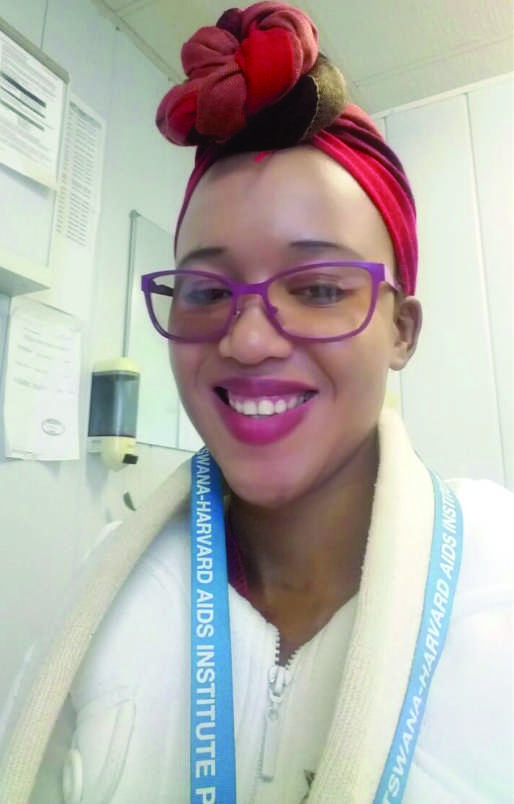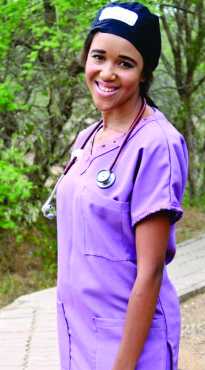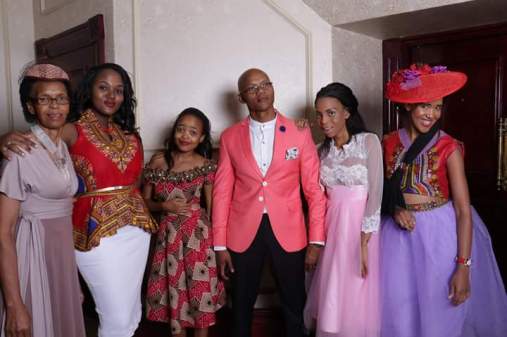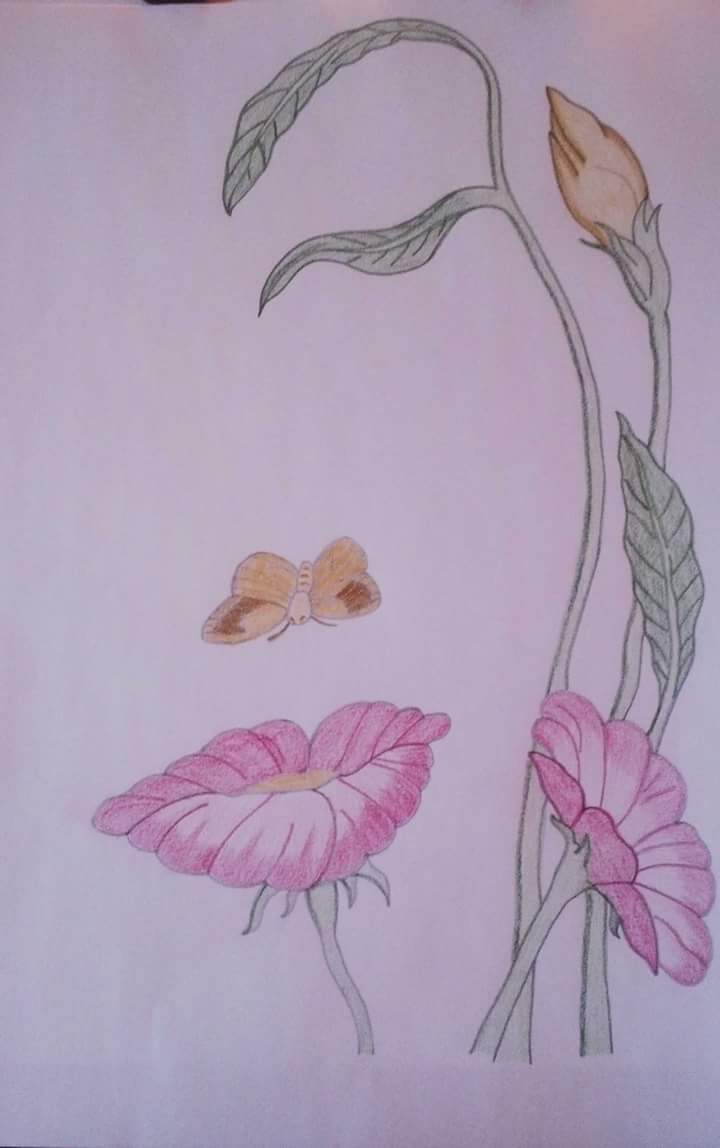 Medicine is defined as a “calling” or the noblest profession, mostly because it involves service of others at their weakest. Doctor Refilwe Mothibamele tells us how her pursuit of a medical career led her to HIV-AIDS Research and what makes it an engaging occupation.
Medicine is defined as a “calling” or the noblest profession, mostly because it involves service of others at their weakest. Doctor Refilwe Mothibamele tells us how her pursuit of a medical career led her to HIV-AIDS Research and what makes it an engaging occupation.
Question: Tell me about your training as a medical doctor.
Refilwe: I did my first year, what we call common year, at the University of Botswana, then proceeded to Kwa Zulu Natal, Durban for Bachelor of Medicine in Surgery for 5 years. In medicine, one has to do internship after medical school for 1 or 2 years as a doctor in training, after which you become a medical doctor. This means that you can practice everything in the medical field. So after graduation, I did my internship at Job Shimankana Tabane Hospital in Rustenburg, South Africa for 3 years. Once you finish your internship, you have the option of pursuing a specialized area such as surgery, obstetrics and gynaecology, paediatrics and public health. This should take 4-8 years. I opted to join Botswana Harvard Aids Institute in January 2016, before pursuing any specialization.
Question: Your experience during internship at Rustenburg?
Refilwe: The hospital was a secondary hospital or a referral hospital, which had very few qualified staff. This helped me gain experience very fast because most of the time, there was no hand holding. When there are a lot of doctors, you tend watch instead of practicing things. The internship also helped me understand team work. Every patient is managed by a team. You need every person in the hospital, nurse, cleaner, radiologists and so on. Even in the handling of patients, not every patient will have just one illness, sometimes they also have social issues which have to be dealt with.
I developed confidence in my work. While at Rustenburg, I worked in a health centre for three months with 3 doctors and 2 of us interns. The other doctors, because of the staff shortage, had to run other hospitals too. This meant that there were days when we were running the various departments, that is, maternity, emergency, outpatient for adults and children. Everything that you learn with the doctors present has to be learnt perfectly because when you are on your own, you have to be confident that what you are doing is right. If you don’t know what you are doing, it is better to ask for guidance without trying, because there is no trial and error with life.
 I also discovered that being a perfectionist was actually a good thing for me because I focused on learning a lot of things as early as possible. By the end of the first year, I was competent. In my second year, I was doing medical officer calls as an intern. I was able to cover for anyone who was not in. I would also do locums in health GP practices when not on duty to gain experience, which helped me a lot.
I also discovered that being a perfectionist was actually a good thing for me because I focused on learning a lot of things as early as possible. By the end of the first year, I was competent. In my second year, I was doing medical officer calls as an intern. I was able to cover for anyone who was not in. I would also do locums in health GP practices when not on duty to gain experience, which helped me a lot.
Question: How is medical training in South Africa different than Botswana?
Refilwe: First, there is a broader spectrum of patients, because most of the conditions that you see in Botswana, you will see in South Africa but some of the conditions you see in South Africa, you will never see in Botswana. Second, South Africa is more advanced in terms of equipment than Botswana. You get a higher level of competency and skill because of the availability of equipment. There is a lot that you learn and it opens up your mind. By the time you back to Botswana, you are very competent in almost anything.
Questions: What challenges have you faced in your medical journey?
Refilwe: First, I did medicine in a foreign country after growing up and studying in Bostwana. Second, I had to learn a foreign language, Zulu, which is the main mode of communication in Kwa Zulu Natal. Patients speak exclusively Zulu, which means you have to find a way to communicate with the patient. So I had to do the course and learn the language all at the same time. Then the Zulu course was taught by a white woman, which was difficult. I am currently fluent, though. The third thing is the prejudice against foreigners, from faculty, hospital admins, nurses etc. It was a huge obstacle. I had to suck it up and find a way to work and complete in the time period given. We were 10 students from Botswana and we supported each other, putting in extra hours, studying and doing procedures together. The fourth thing is that you change a lot as a doctor. You are taught not to be emotionally attached to patients even though you treat them as humans. This helps you think clearly as the doctor. But it may affect your relationships since you tend to detach from everyone. I am learning to separate the hospital and home.
Question: Tell me about your current research work and why you ventured into it.
Refilwe: Both Kwa Zulu Natal and Rustenburg where I did my training had the highest HIV and TB prevalence in South Africa. So I had a lot of exposure in HIV medicine and got to love it. At Botswana Harvard, I am currently working on three trials: The first one is on HIV positive women who received highly active antiretroviral therapy (HAART) during pregnancy in order to prevent mother-to-child transmission (PMTCT) of HIV but do not otherwise meet criteria to initiate HAART for their own health. The second one is to evaluate the safety of issuing Immediate (Antepartum-Initiated) or Deferred (Postpartum-Initiated) TB Preventive therapy among HIV-Infected women in high TB incidence settings. The third research area is on the effect of Ultra-Short-Course TB treatment in order to prevent active Tuberculosis in HIV-Infected individuals with latent or dormant tuberculosis infection. There are other trials running both in Botswana and other Harvard funded research sites worldwide, so we keep on comparing results with the other countries. We share anything exclusive or that needs noting. Even though you are doing the same thing, there are always variables to monitor. We also attend conferences in Harvard annually to discuss progress on research protocols, any difficulties and any new methods that are coming up. Representatives of all the sites, that is a few doctors, quality control, nurses and those who enter information into the system.
Question: Tell me about the partnership between the Harvard Institute and Botswana?
Refilwe: Prevalence of HIV in Botswana was very high. Harvard formed a partnership with government, so that the results of the research are immediately implemented by government. Government support has been positive. As we progress with the research, we may make positive discoveries which are shared with government. Once they agree, we can then choose to halt the research and proceed with implementation. An example is the PMTCT research protocol which yielded good results within a year of research. This gave the Government confidence in HIV research. The program was then implemented without waiting for the full 3-5 years for completion of the protocol, and there have been very few children born with the HIV virus. The few children born with the virus has been caused by errors made by the mother such as missing medication or check-ups. Another one of our major findings which was implemented in July 2016 had been, that patients on ARV treatment have a good immune system and are not prone to a lot of illnesses because there immune system is boosted to almost a normal immune system. A HIV positive person starts treatment when their CD4 count is 350. Currently, they are being put on medication regardless of their CD4 count, because we already know the CD4 count is bound to drop. The body then functions like a normal person with no infection at all. The patient’s body functions like a normal person’s body, chances are that they won’t even progress to AIDS. That is why we advise people to test for HIV regularly, every 6 months to a year.
Question: I am sure research has to receive government approval. How is this process?
Refilwe: It takes about 5 years to implement research. Before you begin the research, you plan everything that will go into it, that is, the blood tests, patient consent, medication to be used, information recording, storage and access, research center and its safety etc. Approval of the research means approval of every detail of the research work. Approval is first from the Government of Botswana, then the US government which funds the research. We have to ensure that both the governments of Botswana and US are in agreement about the research. If there is no approval, this means that information obtained from the country cannot be shared outside its borders. Then there are the regulatory and ethics bodies to ensure patients are not exploited and regulate the information produced by the research.
Question: Are there ever mistakes in research? How are they handled?
Refilwe: There is constant monitoring of the research. Research auditors visit all sites regularly and look at the research safety, the protocols being done, information collection and storage etc. The auditors can correct any error before it gets to a point where it is damaging. There are also quality control staff at the research site who monitor everything that the other auditors are going to be monitoring. It tends to balance everything. Any issues are corrected and the auditors re-check these actions to determine if they are suitable. This prevents any large errors that may affect studies. If there are any large errors, regulatory bodies are informed to evaluate how the damage and determine the way forward.
Question: Are there challenges that you think exist in the current implementation process?
Refilwe: The process of implementation takes long. Although it is necessary, I think it should be shortened because it would enable more advancement. Unfortunately, since the research is not funded by the country, approvals come from the host country and the funding country, making the process longer. Change takes time. You can only push so much.
Question: What is your typical workday like?
Refilwe: I work from 8.00 am to 5.00pm. In the morning, I see patients and record everything in a main sheet. Afternoons are for recording, filling in information in detail for storage in the system where everyone has access to it. I also have to catch up with current research by reading. Research is more relaxed than being in a hospital setting.
Question: Tell me a few words that would define you as a doctor.
Refilwe: Perfectionist and extrovert. I love what I do and ensure that my job is thourough and perfect. I follow protocols and do not take shortcuts when I deal with my patients, despite the circumstances. On the other hand, I am an extrovert. I was drawn to medicine because I like dealing with people. I do not like a situation where I am behind a desk not talking to anyone, behind a screen. I also work well in high pressure situations and work well in teams.
Question: Given the chance, which area would you specialize in and why?
Refilwe: Initially, when I left medical school, I wanted to be a cardio-thoracic surgeon. Currently I would love to do two things: Surgery and HIV AIDS medicine. In HIV-AIDS medicine, I have noticed that we still lagging behind in terms of HIV AIDS management. Working in South Africa exposed me to a better system of HIV/AIDS patient management, so I am able to identify the loopholes in Botswana. I believe that the more research we do in Botswana, the more confidence there is in the results, which will make HIV medicine much better. I love surgery. Surgery can be anaesthetics, putting patients to sleep and monitoring them, or actual surgery where you cut up the patient. In most regional hospitals, there are very few specialized staff, so surgeons have to be competent with both anaesthesia and surgery. Theatre is a team effort, the surgeon monitors the patient to ensure the anaesthesiologist didn’t miss something and vice versa. Since you learn everything as a doctor, without specializing in surgery, I know the basics of that procedure and can pick up any surgical error. You can never manage patients alone.
Question: How would you define success in your career?
Refilwe: Owning my own surgical practice. When you have your own practice as a specialist, you work hand in hand with the hospital because that is where you do your surgery together with the anaesthesiologist. The patient comes to your practice, you identify the problem, if it needs surgery, then you do the surgery in the hospital. There are certain specialists that are not there in the public sector, so the government outsources from the private. They do rounds in the government hospital once in a while depending on the contract.
Questions: Have you had any female mentors or role models?
Refilwe: I used to have a role model in medical school, a female cardio-thoracic surgeon. It is a very high pressure specialty with very few women. Most women who apply for surgery are not expected to succeed. So when you do it so well, you stand out. The only downside is that female surgeons are not able to manage family and hospital at the same time. There is always something that lags behind. She is divorced, but she is running her household quite well.

Questions: How are you intending to handle family and surgery?
Refilwe: In residency, most of the time is spent in hospital because you want to learn as much as you can, every moment that you have. But I think time management is important. If you plan your things well, you shouldn’t feel under pressure to put more hours just to learn something. That is what bogs down most of us. Most doctors are very haphazard, not planning properly. I think if you plan it well, it shouldn’t be a problem.
Question: What advice would you give someone leaving medical school?
Refilwe: Hard work, be dedicated and love what you do. If you do not love what you do, you won’t be able to handle the pressure. There is a lot of pressure to get used to the work environment. When you do internship, people expect you as the doctor to solve their problems. Make sure you have an attitude of humility and willingness to learn, put in a bit more extra time to learn what is required. Then you need to study because things change all the time. Whatever you are taught in medical school in your first and second year, will not be relevant by the time you start to practice. So you need to keep on learning all the time.
Question: Advice for young girls in school?
Refilwe: I would tell them, you can’t fail something that you put your mind to. If you are really into it there is no way that you can fail it. There is always a way that you can get around it and see that it succeeds. So whatever you want, you put your mind to and your heart into it, you will succeed. Then, go into medicine for right reasons. Some people go into it because they think there is money and are disappointed when they find out the contrary. So you are either stuck in the career or you start your life from scratch. And you have put in too many years into it. It is kind of hard to change.
Question: What is your favourite quote?
Refilwe: I just live my life the way it comes. That is what I learnt. Being a perfectionist, you try to plan everything in your life, anything that goes wrong to you seems like a failure. I have to get balance and learn that even though you want everything to be perfect, some things are beyond your control. So just take things as they come and just deal with it.

Question: What is your greatest fear in life?
Refilwe: Not being able to do what I love which is medicine and art. What I value a lot right now is my job and family.
Question: What do you do for fun?
Refilwe: I am an artist. I just draw and give out and display at home. I am hoping one day that I will have a gallery coz I love art. I love drawing. I also sow and make clothes. I learnt in high school loved it from then and learnt more and more, and kept practicing. I have an online business for fashion. I design and tailor clothes. These things help me to de-stress from work.



Great work Dr Refilwe!!and great article indeed.
Being Refilwe’s friend for over a decade truly describes a woman’s worth in this diverse world we live in. Helping people and saving lives is God given. Keep up the good work! #ngwanaPapaka
Marie Curie is the most important women in science.She win the Nobel Prize and the first scientist who won the award twice, in two different fields, physics and chemistry, was voted the leading woman scientist of all time.
invenitmundo.blogspot.com/2016/09/marie-curie-most-important-women-in-history.html